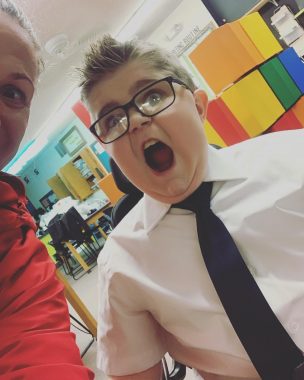How Theater Has Helped My Son Navigate Friendships
Written by |

My family has been on the Duchenne muscular dystrophy (DMD) journey for almost 12 years. During that time, I’ve quietly watched how friendships and making friends have changed for each of my three sons with DMD as they have grown.
I’ve traveled farthest down this road with my oldest son, Max, who is 16 and about to finish his sophomore year of high school. Max was so full of life and energy as a young boy, and people naturally gravitated toward him. He loved to perform and make people laugh.
In preschool and elementary school, Max had lots of play days, was invited to birthday parties, and had friends he could ask to the house. Then he participated in summer theater programs and grew as a performer.
However, disease progression changed how Max’s body worked once he got to middle school. He was still invited to a couple of activities and had a friend who would spend time and text with him. But as high school approached, his friends were physically growing and becoming active in sports and other things that didn’t interest Max and that his DMD wouldn’t allow him to do. He felt left out.
Max decided to leave the environment he had known most of his life and transferred from a small private school with limited resources for theater and the arts to a large public school with a robust theater program and an accessible theater. Unfortunately, the disease progression he was going through and the school move triggered intense anxiety.
It was difficult enough for him to attend school without an anxiety attack, so for a while, making friends or even talking to peers wasn’t something he could do. His posture changed. He would slink down into his wheelchair and hide behind the mask he was mandated to wear during the period of COVID-19 precautions. It was like he wanted to be invisible.
I mourned the changes for Max. I wanted to see that boy with all the energy, and I wanted to watch people gravitate toward him again. But I wasn’t sure that would happen. I was scared DMD had robbed him and me of that liveliness.
That wasn’t the case.
That boy was still in there. It took some time to work with mental health professionals, but he’s finally starting to emerge again this spring. He was part of the school musical, and the time spent with peers during two months of rehearsals and throughout show week demonstrated how much growth he’s experienced.
He wanted to go to the cast party; he had stories about the funny things he said, and he talked about people by name again. Several people stopped to talk to him in the receiving line every night after the show, and people called him by name and laughed with him.
On stage, he was the energetic and happy performer I had known him to be as a child. He had solos and used his chair to enhance the show; he belonged up there!
When he was a young boy, his friends were often his fiercest protectors at school. I have countless stories about how they explained his disease to substitute teachers, helped carry his books, and held umbrellas over his chair so it wouldn’t get wet out at recess or walking across campus. He went without that for a couple of years, and he felt lonely.
This last week, he found it again. As scary as it is to share with you that he fell backstage during a costume change at rehearsal, he didn’t need his dad or me. No one from the school had to call us. One of his friends from the show was right there and stopped the rehearsal out of concern and got help for him immediately. He was OK — shook up and with a scrape and a bruise, but OK — and the show went on.
Max later told me he didn’t need to call us because he felt comfortable where he was and with his people. I’m crying as I type this because that is what I had been wishing and praying he would find again. It is a breath of fresh air that allows his mom to breathe easily. It makes his life better, and it makes my heart lighter.
I think Duchenne is hard enough, and no one should have to do it alone. My boys are from a big family and have love and support from their parents and siblings. Is that enough? I hope so because I think it’s hard for parents to manufacture friendships for their children once they get to middle and high school. They are kind of on their own, and it’s not easy. I’m thankful for what Max has found through theater and school.

Max, with mother Betty beside him taking the selfie. (Photo by Betty Vertin)
Note: Muscular Dystrophy News is strictly a news and information website about the disease. It does not provide medical advice, diagnosis or treatment. This content is not intended to be a substitute for professional medical advice, diagnosis, or treatment. Always seek the advice of your physician or another qualified health provider with any questions you may have regarding a medical condition. Never disregard professional medical advice or delay in seeking it because of something you have read on this website. The opinions expressed in this column are not those of Muscular Dystrophy News or its parent company, Bionews, and are intended to spark discussion about issues pertaining to muscular dystrophy.







Leave a comment
Fill in the required fields to post. Your email address will not be published.